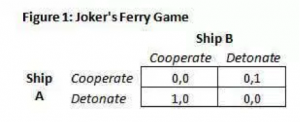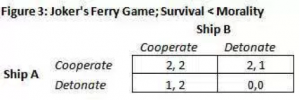The Joker’s Game (Theory)
Setting the Stage:
In the cinematic film The Dark Knight, there are many instances where game theory is involved. However, the most straightforward and pivotal example is during the third act of the movie. During this scene there are two ferries filled with people. One ferry carries the population of Gotham’s prison while the other ferry carries normal, law-abiding citizens. The two ferries are on their way to evacuate when all of a sudden The Joker’s voice is projected on the intercom for both ferries. He explains that he has wired both ferries with powerful explosives, and the detonator for each ferry is in the hands of the other. In addition, he explains that both ships have thirty minutes to decide whether to blow up the other and if neither ship destroys its counterpart, the Joker will personally blow up both ferries.
Thus the following matrix illustrates how The Joker believes his game will pan out:
This game is very easy to solve. Neither ship has any incentive to cooperate and (Detonate, Detonate) becomes the dominant strategy. In addition, there is even more incentive to detonate first as you can potentially save your own ship if you do it before the other ship. Thus, in this particular matrix one or both ships would have exploded and The Joker would have accomplished his goal of showing that people are just as evil as he is when put under certain circumstances.
The Decision:
On the ferry containing the prisoners, the decision to detonate becomes decentralized and the guards, out of self-perseverance has allowed any one prisoner to grab the detonator. A decentralized decision should lead to the optimal play as any single individual among an entire ferry of five hundred should have a preference for survival yet no prisoner takes the initiative to execute the detonator.
On the other ferry containing civilians, the decision is left to a simple majority vote and comes out to a decision to detonate the other ferry at a rate of almost three to one. The same thing happens, as on the prisoners’ ferry yet no single civilian is willing to push the button either.
Thus, we can factor in morality along with survival in the following modified matrix:
In this second example, the pure strategy equilibria are (cooperate, detonate) and (detonate, cooperate) with a mixed Nash Equilibrium of playing cooperation and detonation with a probability of 0.5 for both ferries.
As the final minutes draw to a close, neither ship has shown signs of intending to blowup the other ship. This still does not make sense according to the second matrix, as choosing to detonate is still the optimal choice given that Survival is presumed to yield a greater return compared to Morality.
The Joker watches in disbelief as his thirty-minute timer runs out and neither ship has detonated. How can this be possible? In both game matrices, Ship A and Ship B’s optimal choices and only chances of survival include detonating the other ship; why would both ships ever choose to cooperate? Christian Bale’s Batman then explains that The Joker’s assumption was wrong and that not everyone in Gotham is evil. This leads to the third and final matrix where Morality trumps Survival. In this final matrix, the pure strategy Nash Equilibrium would be to never detonate as cooperation will always be better than detonating the other ship.
This entire scenario relates back to the analysis of Game Theory we learned in class but with a simple twist added. The fact that The Joker did not account for humanity’s natural sense of morality (given that he is a psychopath) means that his prediction of the game was inaccurate and ended with Batman taking out the Joker before he could detonate both ships by himself. The lesson I learned out of this entire dilemma was that in class we always take the prediction of players and their decisions as fact. However, in the real world, unknown variables and anomalies are always shifting outcomes and nothing is ever certain.



